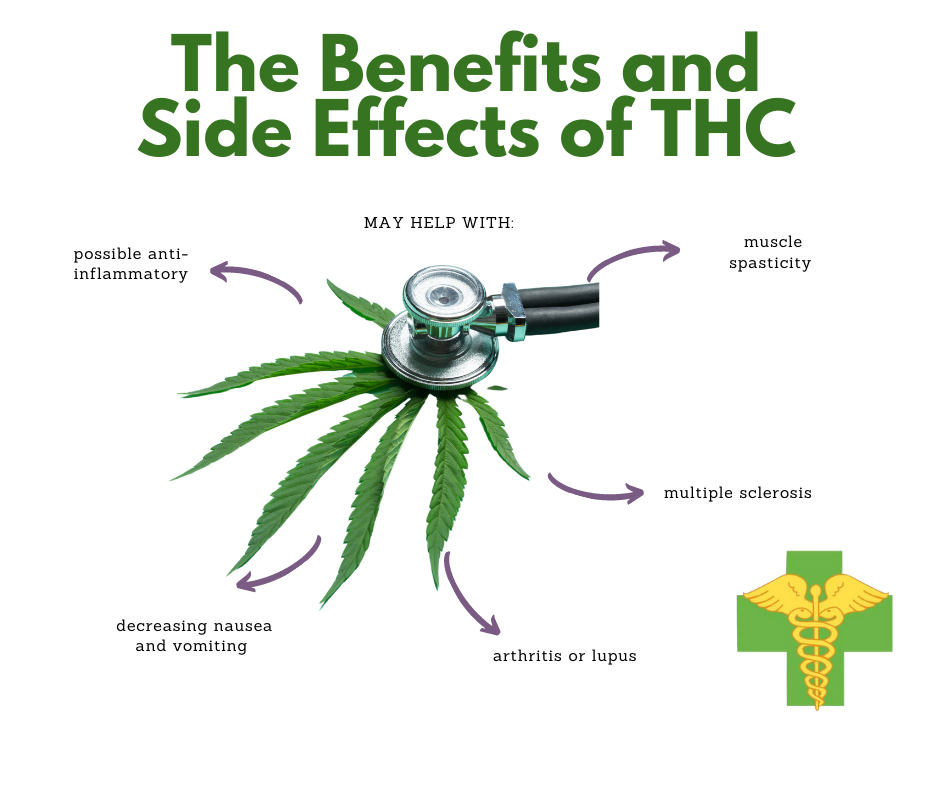If you are a medical marijuana patient, THC may provide several benefits and reduce some of your negative symptoms and side effects. However, if you want to utilize medical marijuana as a medicine, it’s crucial to understand all of THC’s potential benefits as well as some of its possible drawbacks. Keep reading for more information, to learn more about what THC is and how it can help you.
What Is THC?
THC is the cannabinoid in marijuana that produces euphoria and gives you a relaxed, high feeling. It gives marijuana most of its psychoactive properties and is most associated with getting high or using marijuana for recreational purposes. However, recent studies show that it has several potential medicinal uses as well.
THC stands for delta-9-tetrahydrocannabinol (delta-9 THC). It affects users by binding with cannabinoid receptors in the brain. These cannabinoid receptors are responsible for regulating our body’s endocannabinoid system (ECS). This newly discovered system is responsible for maintaining balance in several of our body’s regulatory systems.
THC’s Potential Benefits
THC has several potential benefits for medical marijuana patients. It can potentially help with chronic pain, inflammation, glaucoma, insomnia, lack of appetite, nausea, and anxiety.
THC is a possible anti-inflammatory that may work great for treating conditions like arthritis or lupus, which are characterized by inflammation. THC is also a possible anticonvulsant, meaning it may prevent or reduce seizure activity in the brain. It also shows promise as a treatment for, especially when caused by chemotherapy or illness.
THC has even shown promise as an analgesic, meaning that it can relieve pain without causing much of a “high.” THC also acts as a muscle relaxer, which may help people with diseases multiple sclerosis because it potentially helps improve muscle spasticity.
Finally, THC can be used as a sleep aid or antianxiety medication. THC can help people fall asleep faster and stay asleep longer. THC is also possibly effective at reducing anxiety, even in small doses, making it a great alternative to pharmaceutical medications that are more addictive or have worse side effects.
The Side Effects of THC
Although THC provides many benefits, there are some drawbacks as well. It can cause several temporary side effects, including increased heart rate, coordination problems, dry mouth, red eyes, slower reaction times, memory loss, and anxiety. THC can also cause fatigue because it acts as a depressant on the central nervous system (CNS).
While THC is not addictive like many pharmaceutical medications are, it does produce a tolerance. This means that users will require more THC to get the same result after using it regularly.
Finally, THC also has some possible withdrawal symptoms once you discontinue usage. THC withdrawal can include irritability, panic attacks, unusual dreams, insomnia, poor appetite/weight loss, restlessness, and depression.
Conclusion
Although THC might not be perfect for everyone, thousands of medical marijuana patients swear by its importance. Besides its potential use to treat several debilitating conditions, THC also has fewer side effects than many pharmaceutical drugs used to treat the same conditions. THC is still a controversial drug in society today, but that doesn’t mean that it shouldn’t be considered as a natural alternative for improved health and wellness.
If you’re interested in learning more about medical marijuana, contact our team at Medical Alternatives Clinic today.
Sources:
https://www.ncbi.nlm.nih.gov/pmc/articles/PMC5877694/
https://www.nccih.nih.gov/health/cannabis-marijuana-and-cannabinoids-what-you-need-to-know
https://www.ncbi.nlm.nih.gov/pmc/articles/PMC5767492/
https://www.ncbi.nlm.nih.gov/pmc/articles/PMC3728280/
https://www.ncbi.nlm.nih.gov/pmc/articles/PMC3728280/
https://www.ncbi.nlm.nih.gov/books/NBK224382/
https://www.ncbi.nlm.nih.gov/pmc/articles/PMC4827335/
https://pubmed.ncbi.nlm.nih.gov/3009708/
https://www.healthline.com/health/marijuana-withdrawal#symptoms

